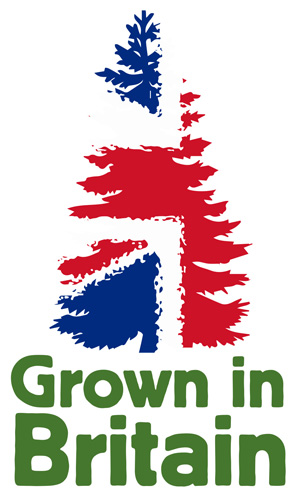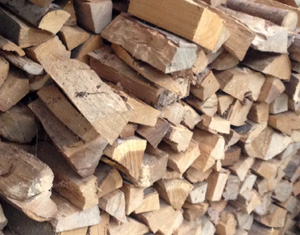‘Grown in Britain’ campaign could help smaller woodland owners

A recent report on "Creating a sustainable future for our woodlands and forests" forms the basis for a new campaign - Grown in Britain. This campaign aims to promote products grown in UK woodlands, to pull private funding towards British Forestry and to harness the positive energy around woodlands in general. The Grown in Britain campaign grew out of the 2012 Independent Panel on Forestry and is making a good start at promoting UK timber production. At a Woodfuel conference (last Autumn) in Surrey Hills , the director of the campaign, Peter Bonfield, joked that this is about being "Grown in Britain" and not about a "Groan in Britain". He wants to avoid the sort of jokes that beset the Festival of Britain where the official slogan, "Britain can Make it" was widely reworded as "Britain can Fake it".
Peter Bonfield, an engineer by background, has convened meetings which bring together buyers of building materials and firewood with small timber growers to work out how to remove obstacles to more local sourcing of useable timber and wood fuel.  Asked at the Woodfuel conference how suppliers can best promote themselves he said they should "just join in! - use the Grown in Britain logo and put it on your vehicles, business cards and invoices - you don't need a licence - just get on with it." The logo comes in a small range of designs based around the Union Jack, a tree outline and the Grown in Britain campaign title. One of the promoters told me he was a bit worried that it looked rather like the National Front logo, but at least it incorporates trees and the organisation aims to be unifying force in the British landscape.
Asked at the Woodfuel conference how suppliers can best promote themselves he said they should "just join in! - use the Grown in Britain logo and put it on your vehicles, business cards and invoices - you don't need a licence - just get on with it." The logo comes in a small range of designs based around the Union Jack, a tree outline and the Grown in Britain campaign title. One of the promoters told me he was a bit worried that it looked rather like the National Front logo, but at least it incorporates trees and the organisation aims to be unifying force in the British landscape.
The campaign has been supported by the great and the good including the Duchy of Cornwall, Tilhill, the Forestry Commission, B&Q, Kingfisher and DEFRA (Department for Environment, Food and Rural Affairs). In fact the Grown in Britain report lists over 250 organisations (including woodlands.co.uk!) which are supportive of the initiative. The GIB organisers want to get support from DECC (Department of Energy and Climate Change) but the Forestry Commission Chairman, Sir Harry Studholme, slightly surprised me by saying, "taking DECC along this route is a challenge - I've had problems with DECC in other areas". Both he and Peter Bonfield agree that officials at DECC seem to be coming round to supporting the Grown in Britain project.
Peter Bonfield hopes that the "Grown in Britain" campaign will be to British Forestry what the Little Red Tractor has been to British Farming , and he says his confidence is based on his observation that British politicians are "up for it" - and the report is enthusiastically endorsed by the DEFRA minister, Owen Paterson. Bonfield also observes that companies have a commercial motivation in that "they want to show their customers that they are buying in Britain". In addition, most larger British companies have Corporate Social Responsibility (CSR) departments and they are keen to support local suppliers. One example is Waitrose who are now buying firewood for heating some of their stores from small woodland owners. It looks as though Grown in Britain is itself growing and the organisers have already set a date for next year's Grown in Britain week which is from 13th to 19th October 2014.
, and he says his confidence is based on his observation that British politicians are "up for it" - and the report is enthusiastically endorsed by the DEFRA minister, Owen Paterson. Bonfield also observes that companies have a commercial motivation in that "they want to show their customers that they are buying in Britain". In addition, most larger British companies have Corporate Social Responsibility (CSR) departments and they are keen to support local suppliers. One example is Waitrose who are now buying firewood for heating some of their stores from small woodland owners. It looks as though Grown in Britain is itself growing and the organisers have already set a date for next year's Grown in Britain week which is from 13th to 19th October 2014.
Comments are closed for this post.
Discussion
I was interested to read this blog post about Grown in Britain. My experience so far is that this initiative does not match the rhetoric. As an award-winning small woodland, we have repeatedly tried to engage with the Grown in Britain initiative without success. The web site is full of rhetoric and sound bytes but very short on information, and seems very much geared towards the large corporate sector. I find nothing there relating to small woodlands at all.
The fact is that small woodlands should be the priority: the majority of woodlands in Britain are small and small woodlands have a high proportion without management plans, and a high proportion without proper management. This is the group with which the initiative needs to engage. Even enthusiastic woodland owners such as ourselves cannot afford to go to conferences and meetings and Grown in Britain’s policy of relying on face-to-face meetings with a selected few fails to engage with the grassroots of woodland owners.
It also appears that one part of the Grown in Britain organisation does not know what the other part is doing. Only yesterday I enquired by email about how I could obtain and use the Grown in Britain logo for our products (arisings from management for wildlife). I was told that they are developing a licensing system, and will send us an application pack when this becomes available. There will be a fee, and although I asked how much (repeatedly) I was not told how much this will be. This blog, however, implies you can just download and use the logo for free, with no constraints on eligibility. The last thing small woodland owners need is yet another scheme of accreditation that is, like FSC and UKWAS, unobtainable to the vast majority of small-scale producers because of cost. This will have the effect of pushing them even further out to the margins while big corporate producers access markets that require accreditation for which smaller producers cannot pay. Which is it? Can anybody use the logo, or do you have to pay?
We also asked how much it costs to have our logo on their web site as a supporter – twice – and nobody has replied.
We are passionate about UK grown, sustainable wood. We want to be involved, but have been rebuffed at every turn, and now have no idea at all whether or not we are allowed to put the Grown in Britain logo on our wood products. Until the confusion, lack of information and lack of communication and engagement is addressed, we cannot support this initiative. Time to get your act together, Grown in Britain!

Hi Sarah,
Grown in Britain now have a link to the application pack that you are asking about on their website at http://www.growninbritain.org/get-involved/licence/apply-for-a-licence/
Hope this helps,
Mike
Mike Poole
23 May, 2015